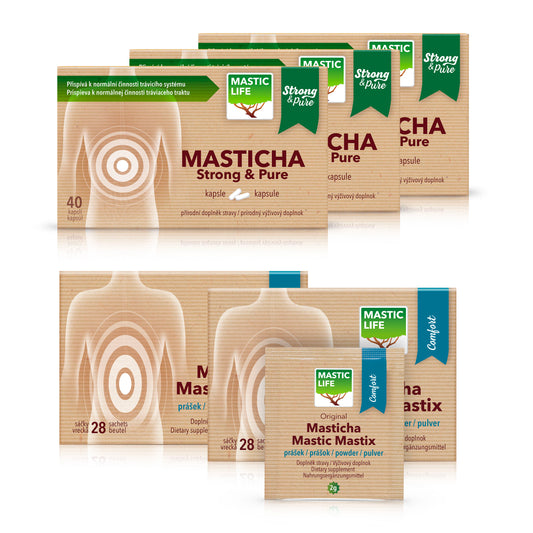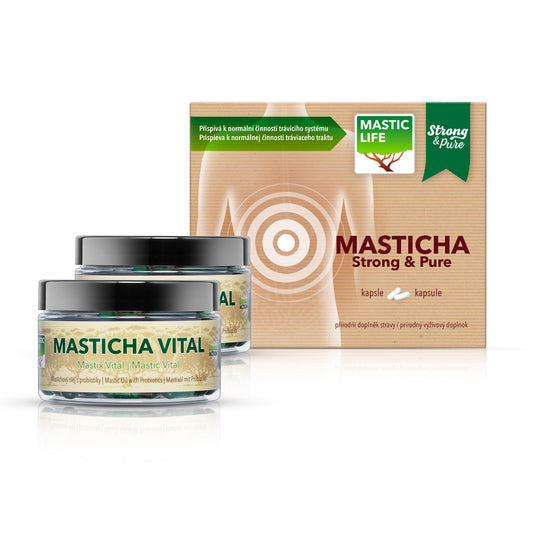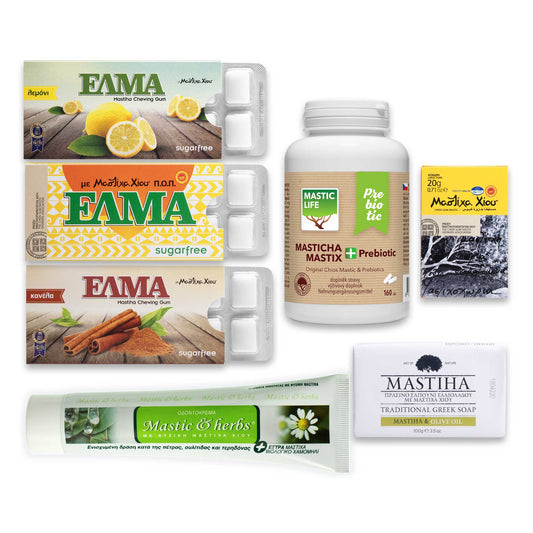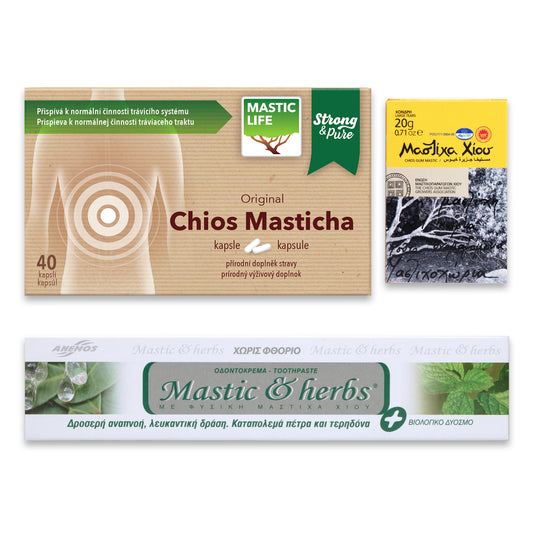Heartburn: Milk, Baking Soda and Other Treatment Myths
There are many tips for the treatment of heartburn - some more, some less helpful. Time-tested home remedies that were used in grandmother's time are still supposed to provide relief today. They include drinking cold milk when it burns, or taking a digestive drink after a meal. But does tried and tested also mean reliable help for heartburn? We explain the most common treatment myths.
Overview: Heartburn – Milk, Baking Soda and Other Treatment Myths
Milk helps with heartburn – or doesn’t it?
Milk against heartburn? Yes, say some. No, say the others. From a scientific point of view, we have to agree with the second group. A Korean research group found out that milk triggers heartburn more often than water, while milk with a lower fat content triggers it less often.
Yoghurt also has anything but a positive effect: It was found that acidity levels after consumption of the dairy product were very high - similar to those of acidic citrus fruit juices.
- Some experts even believe that milk can increase heartburn because it has a slightly acidic pH (4.5).
Another factor that comes into play with milk is that some people cannot tolerate the lactose it contains. According to estimates, lactose accounts for about 15 percent of the population in Germany. Drinking milk can therefore put an additional strain on the digestion.
All in all, it may be that milk helps some people against heartburn. This is possibly due to the fact that the triggers for heartburn are as different as the patients themselves - and just as some people tolerate coffee and others do not, this can also be possible with milk. However, from a scientific point of view, it is not recommended that people drink milk for heartburn.
From grandma's bag of tricks: Baking soda against heartburn
Even grandmother knew that if you suffer from heartburn, you should use the tried and tested home remedy sodium bicarbonate. The baking soda can be found in almost every kitchen - and is a true all-round talent. For example, it is suitable as a detergent, all-purpose cleaner, for baking - and for heartburn?
Simply dissolve a teaspoon of the powder in a large glass of water, stir, drink - and the discomfort disappears for a little while.
Today, however, people take a more critical view of baking soda: because even if it is true that baking soda neutralises stomach acid - unpleasant side effects can occur.
Although bicarbonate of soda alleviates the symptoms for a short time, the cause is left out.
When sodium bicarbonate dissolves in water, carbon dioxide - i.e. carbonic acid - is formed. These gas bubbles can cause the sphincter muscle, the lower oesophageal sphincter (UES), to open to let the gas escape. The burping may seem relieving at first, but it can also cause acidic stomach contents to enter the oesophagus.
Too much sodium bicarbonate can lead to the formation of stomach acid being stimulated.
Worth knowing:
Anyone who eats a low-sodium diet should generally avoid using sodium bicarbonate for heartburn.
This is because sodium bicarbonate, as the name suggests, contains a large amount of sodium.
Digestive? The digestive liquor after a meal
After a rich meal, schnapps aids digestion, so the saying goes. However, anyone who reaches for alcohol during or after a meal is more likely to delay digestion than to help it.
It is true that the unpleasant feeling of fullness is reduced thanks to alcohol, especially after a sumptuous meal, because it relaxes the stomach muscles - but at the same time the digestion of the food is slowed down.
This means that although there is short-term relief, in the long term it can lead to indigestion.
If you suffer from heartburn, you should stay away from alcohol. There are two reasons for this:
- Alcohol relaxes the muscles. This is a disadvantage for those who suffer from heartburn, because the oesophagus, which is supposed to prevent the acid from flowing back, is a muscle. If it is loose, the stomach acid can flow back into the oesophagus more easily.
- Alcohol is an acidic liquid. It leads to excessive acid production in the stomach.
In consequence, this means that the digestive liquor is neither digestive, nor can it prevent or alleviate heartburn. On the contrary: alcohol can even cause heartburn.
Other myths – or: When the rumour mill simmers
People who suffer from heartburn try a lot of things to get rid of their symptoms. Some people swear by brushing their teeth after eating. There is no scientific evidence for this tip.
Only one thing is true: heartburn sufferers should pay more attention to their oral hygiene, because the acid that runs back into the mouth can attack the teeth and gums.
Another myth says that having a cigarette after a meal prevents heartburn. However, just the opposite is true: experts now agree that there is even a link between heartburn and cigarette smoking.
The frequency of reflux (backflow) is even said to increase with it throughout the day. The reason: similar to alcohol, the sphincter muscle on the stomach is loosened. This makes it easier for the acidic gastric juice to flow back into the oesophagus.
So the cigarette afterwards is taboo - and what about a digestive nap? You'd better refrain from that, too. It's better to go for a walk around the block. Because: Exercise keeps the digestive system on its toes, the stomach empties faster and the risk of heartburn is reduced.
| Home Remedy / Myth | Does it help? | Notes / Risks |
|---|---|---|
| Milk | Sometimes, but generally no | Milk can trigger heartburn due to slight acidity; lactose intolerance may worsen symptoms |
| Yogurt | No | Acid levels after consumption are high, similar to citrus juice |
| Baking soda | Temporary relief | Neutralizes acid but can cause burping, may stimulate more acid; high sodium, avoid in low-sodium diets |
| Digestive liquor (alcohol) | No | Relaxes stomach muscles, slows digestion, increases reflux risk |
| Cigarette after meal | No | Loosens lower esophageal sphincter, increases reflux frequency |
| Brushing teeth immediately after meal | No | No effect on heartburn; oral hygiene is important due to acid |
| Short nap after meal | No | Digestion slows; better to walk to help stomach emptying |
Bottom line:
Baking soda, milk or even good old digestive liquor have proven to be of little help in treating heartburn. However, sufferers need not despair: there are certainly ways to alleviate the symptoms. You can try alternative approaches as well as various medications. Or you can take preventive action - and avoid heartburn in the first place thanks to the right diet.
Mastic toothpastes along with perfect dental hygiene may help with gum disease. Consult this alternative with your dentist. You do not know the mastic and do not know anything about its effects? Read about it here: 10 Reasons Why (and How) To Use Chios Mastic Gum
FAQ – Heartburn Home Remedies Myths
Does milk help with heartburn?
Scientific studies show milk can trigger heartburn more than water, especially higher-fat milk. Its slight acidity and lactose may worsen symptoms for some people.
Is baking soda a good remedy for heartburn?
Baking soda neutralizes stomach acid temporarily but can cause gas that relaxes the lower oesophageal sphincter, potentially worsening reflux. Excess use may stimulate more acid production.
Does digestive liquor help digestion and heartburn?
Alcohol relaxes stomach muscles and increases acid production, which can worsen heartburn symptoms and delay digestion.
Mastic for your gastrointestinal tract
-
 8-week treatment 🗓️
8-week treatment 🗓️Mastic 8 weeks
Regular price 336,00 PLNRegular price420,00 PLNSale price 336,00 PLNSale -
 60-day treatment 💪
60-day treatment 💪Mastic Gum Extra for 60 days
Regular price 599,00 PLNRegular price753,00 PLNSale price 599,00 PLNSale -
 Gift set 🎁
Gift set 🎁Mastic „Life with Mastic"
Regular price 250,00 PLNRegular price274,00 PLNSale price 250,00 PLNSale -
 Gift set 🌿
Gift set 🌿Mastic „Pure Mastic“
Regular price 129,00 PLNRegular price141,00 PLNSale price 129,00 PLNSale





